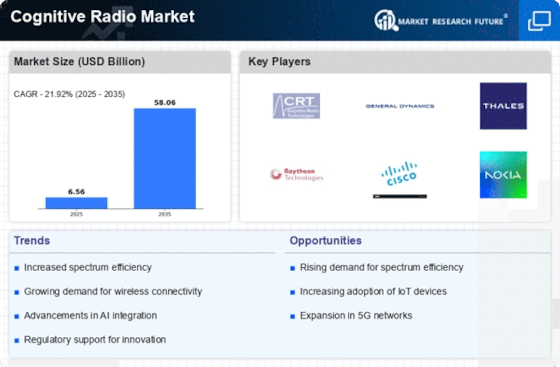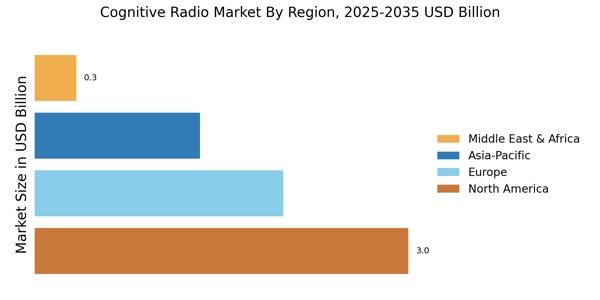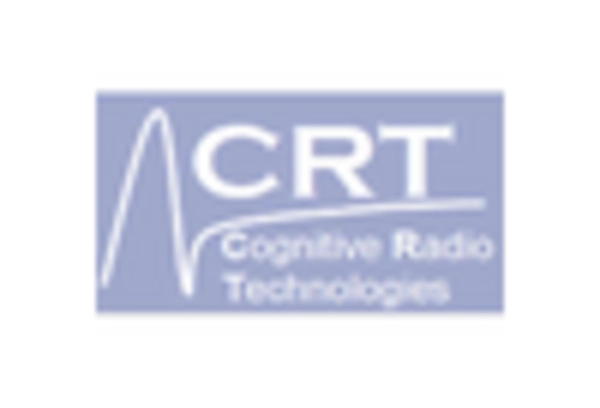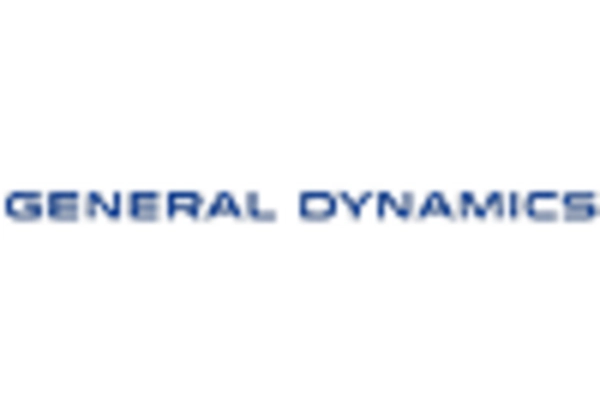Growing Adoption of Smart Devices
The Cognitive Radio Market is witnessing a surge in the adoption of smart devices, which is driving the demand for advanced communication technologies. As consumers increasingly rely on smart devices for various applications, the need for efficient and reliable wireless communication becomes critical. Cognitive radio technology facilitates this by allowing devices to communicate more effectively, optimizing spectrum usage in real-time. The proliferation of smart home devices, wearables, and IoT applications is expected to propel the cognitive radio market forward. Recent data indicates that the number of connected devices is projected to reach over 30 billion by 2025, further emphasizing the necessity for cognitive radio solutions that can manage the complexities of such a vast network. This trend highlights the potential for cognitive radio systems to play a pivotal role in the future of smart device communication.
Increased Demand for Spectrum Efficiency
The Cognitive Radio Market is experiencing heightened demand for spectrum efficiency due to the exponential growth of wireless communication. As the number of devices connected to the internet continues to rise, the need for efficient spectrum utilization becomes paramount. Cognitive radio technology enables dynamic spectrum access, allowing devices to intelligently identify and utilize available frequencies. This capability is particularly crucial in densely populated urban areas where spectrum scarcity is a pressing issue. According to recent estimates, the cognitive radio segment is projected to grow at a compound annual growth rate of over 15% in the coming years, driven by the necessity for more efficient communication solutions. The ability of cognitive radios to adapt to changing spectrum conditions positions them as a vital component in addressing the challenges of modern wireless communication.
Regulatory Support for Spectrum Management
The Cognitive Radio Market is benefiting from increasing regulatory support for effective spectrum management. Governments and regulatory bodies are recognizing the need for innovative solutions to address spectrum scarcity and interference issues. Cognitive radio technology aligns with these regulatory initiatives by providing a framework for dynamic spectrum access, which can enhance overall spectrum efficiency. Recent policy changes in various regions have encouraged the adoption of cognitive radio systems, facilitating their integration into existing communication infrastructures. This regulatory support is expected to drive market growth, with projections indicating that the cognitive radio market could expand significantly in the next few years. The alignment of cognitive radio technology with regulatory objectives positions it as a key player in the future of spectrum management.
Emerging Applications in Defense and Security
The Cognitive Radio Market is increasingly being driven by emerging applications in defense and security sectors. Cognitive radio technology offers enhanced communication capabilities that are essential for military operations, where reliable and secure communication is paramount. The ability to dynamically access and utilize available spectrum can provide a strategic advantage in various defense scenarios. Recent reports indicate that defense spending on advanced communication technologies is on the rise, with cognitive radio systems being a focal point for many military organizations. This trend suggests a robust growth trajectory for the cognitive radio market, with potential revenues reaching several billion dollars in the defense sector alone. The integration of cognitive radio in defense applications underscores its importance in ensuring secure and efficient communication in critical situations.
Advancements in Wireless Communication Technologies
The Cognitive Radio Market is significantly influenced by advancements in wireless communication technologies. Innovations such as 5G and beyond are reshaping the landscape of telecommunications, necessitating the integration of cognitive radio systems. These systems enhance the performance of wireless networks by enabling more efficient use of available spectrum. The deployment of 5G networks, which require higher data rates and lower latency, creates a fertile ground for cognitive radio applications. Market analysts project that the cognitive radio segment will witness substantial growth, with estimates suggesting a market size exceeding 10 billion USD by 2027. This growth is largely attributed to the increasing need for adaptive communication systems that can seamlessly operate within the evolving wireless ecosystem.

















